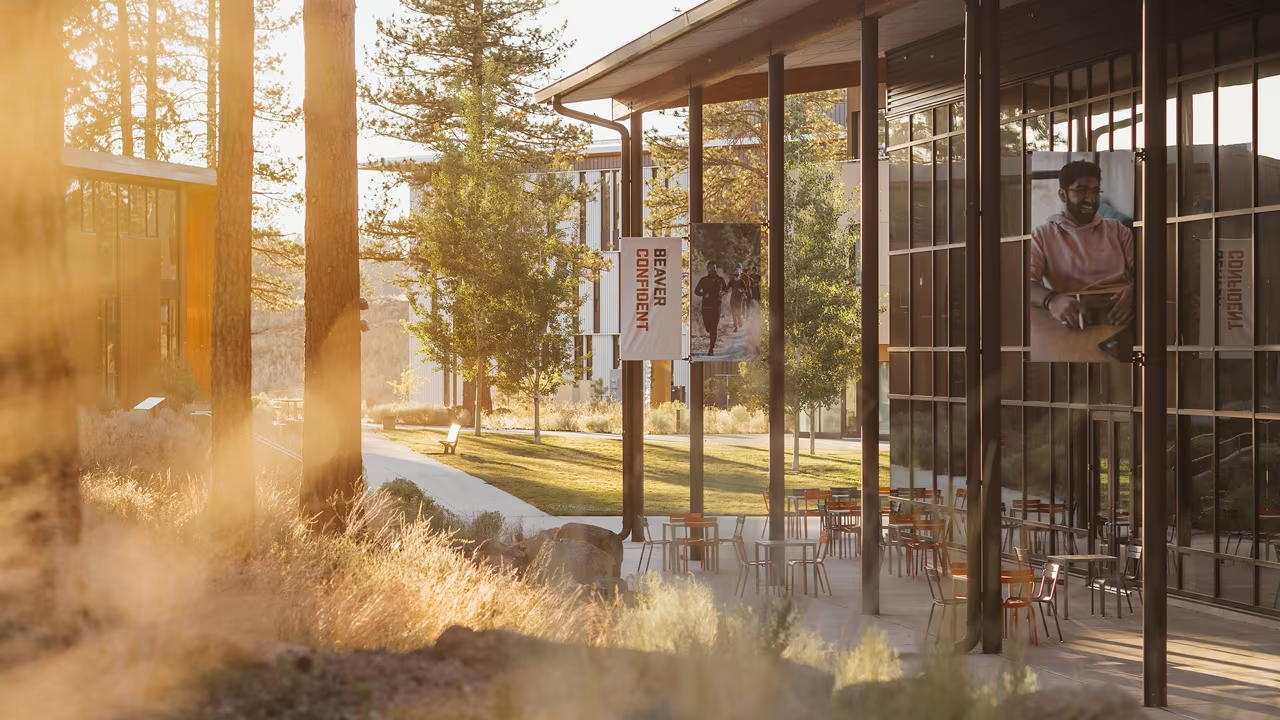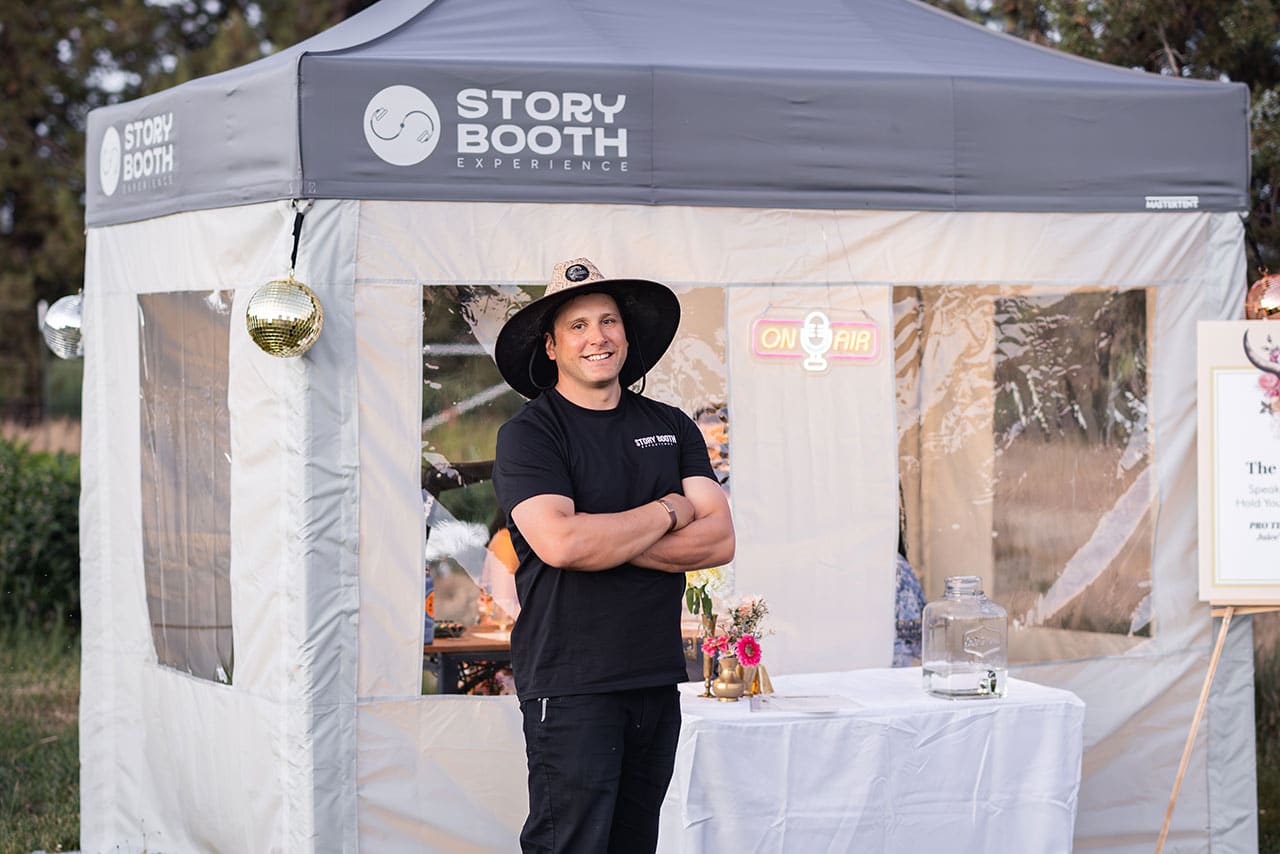Jefferson Greene remembers his grandmother, Verbena “Sasawaipum” Greene, telling stories about the first people and the trees, mountains and animals that spoke with the breeze. Most of all he remembers her words about the water and tributaries of the Deschutes River.
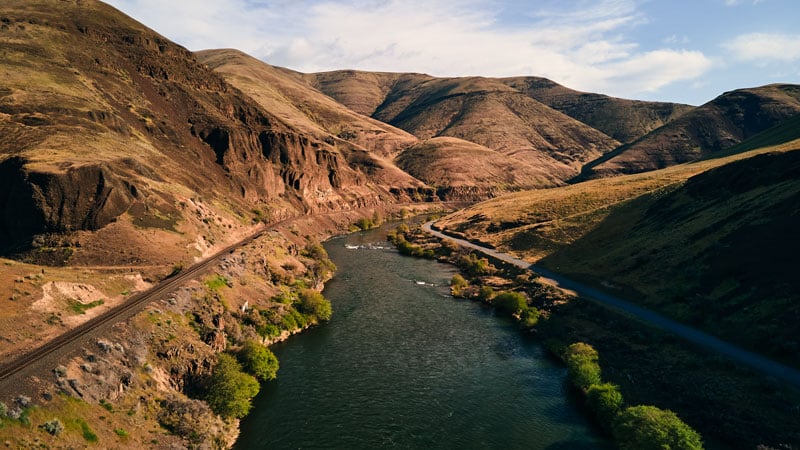
His grandmother’s is just one voice among the many elders who have lived on the land of the Confederated Tribes of Warm Springs. As both water and Native languages recede under modern pressures, contemporary voices seek to connect newer generations with traditional practices from the past, bring them into the present and carry them into the future. Through the revitalization and reverence of language, craft and tradition, Native people such as Greene and Brigette McConville, a fisherwoman, artist and cultural historian, connect to the river and teach others about its past and the need to protect its future.
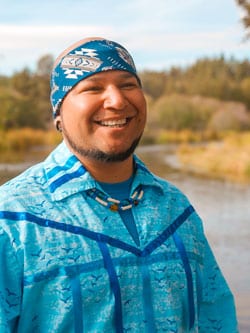
ESSENTIAL HISTORY
Much knowledge about the river was passed down through oral history by the generations of elders who have lived on the 1,019-square-mile Warm Springs Reservation. The tribes include a confederacy of three original bands of Wasco, two bands from Warm Springs, and members of the huge Paiute population spread across five states.
The Deschutes River starts from snow-fed headwaters near Little Lava Lake in the Cascade Mountains. It then flows through rugged and arid country, ribboning through deep, rim-rocked canyons along the way that form fertile valleys on its 252-mile northward stretch to the Columbia River. The Warm Springs River is the largest watershed within the reservation and the largest tributary to the Lower Deschutes. The river and creeks that cross the Warm Springs Reservation provide essential habitat for wild populations of spring and fall Chinook, mid-Columbia River summer steelhead, bull trout, redband trout, Pacific lamprey and a variety of non-salmonid species.
Tribal members still fish for salmon with dip nets and collect lamprey at Sherars Falls, which was the site of a crossing point for local tribes as well as a sacred fishing ground. Today, fish are caught from an elaborate scaffolding and are used for ceremonial purposes and for subsistence distribution to tribal members.
TEACHING TRADITION
It’s from the banks of the Deschutes that Jefferson Greene collects tule reeds to create traditional items, including a recently completed 16-foot-long canoe that he paddled on the river with his young son aboard. A member of the Warm Springs Tribe, Greene wants to revitalize and protect the Tribe’s cultural and ceremonial practices. He has learned songs, stories, drumming and basketry from elders that he hopes to pass on. As an Ichishkiin language instructor, he seeks to preserve the language, while maintaining ancient traditions by building canoes and sharing river adventures with young people from across the Northwest. Greene has been a main force in revitalizing the canoe tradition at Warm Springs. A long canoe can accommodate as many as thirty people at a time as they traverse lakes, reservoirs and the ocean. He persuaded the Tribal government to purchase an ocean-going canoe so that groups, with an emphasis on teenagers, could participate in the Northwest Tribal Canoe Journeys, a coastal event drawing together tribes from across the region. Greene brought together Native youth from the Warm Springs, Yakama and Umatilla reservations for the experience, reinforcing Indigenous history and encouraging important cultural and traditional values.
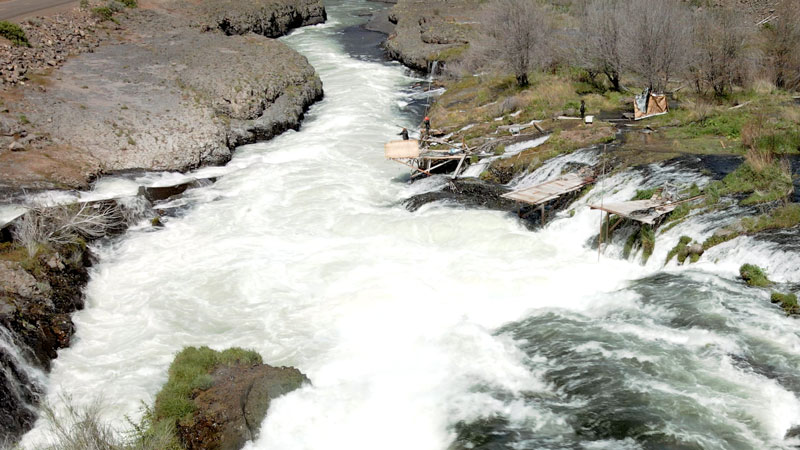
Greene, an executive at the Columbia River Institute for Indigenous Development Foundation, is passionate about the value he places on language, culture and water. “Our relationships have been tied through water,” he said. “It’s important that it run free, for that freedom to flow…and to give life. In ceremonies we start and finish with water.”
To help expand the cultural dialogue, Greene was commissioned to create the tule reed canoe he paddled on the river with his son as part of the current “Creations of Spirit” exhibition at the High Desert Museum, which has the goal of immersing visitors in the Indigenous Plateau worldview.
FISHING THE WATERS
Brigette McConville has spent her life on the river and is an important steward of varying cultural traditions, including fishing and beading arts—two of the historically most-traded items on the Columbia River. As a child, she caught salmon and lamprey, and she has owned and operated Salmon King Fisheries with her husband Sean McConville on the Warm Springs Reservation for more than a decade. The shop processes and provides Columbia River-caught salmon, a primary food source for local tribes for thousands of years. McConville and the Confederated Tribes of Warm Springs define themselves as Salmon People, and her life has been dedicated to the water, and particularly to the fish: she served as the Columbia River Inter-tribal Fish Commissioner on the Fish and Wildlife Committee of the Confederated Tribes of Warm Springs, and as a Warm Springs Tribal Council member. Fishing is an important part of tribal history and McConville’s goal is to protect water throughout the Columbia Basin for generations to come. “But it is going to be a tough task,” she said. “Mother Nature is very tired and is about ready to give up on human nature.”
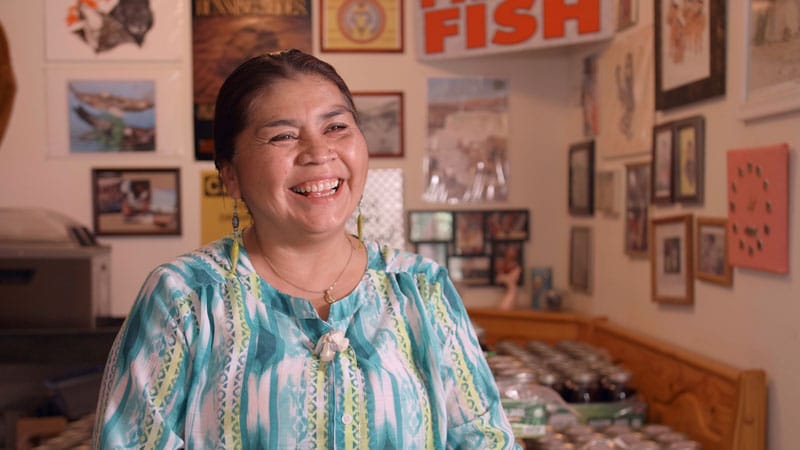
For McConville, a producer of an upcoming documentary that amplifies Indigenous voices on the subject of water, the idea for the film, A Reflection of Life, came about during a discussion of its importance and what it means to her. “I have respect for water and cherish it greatly,” she said. The intention of the project was to capture elders’ and others’ traditional and cultural viewpoints on water and its importance to them,” she said.
DREAMS OF WATER
Greene explained that in times of water deprivation, he and others “go into the places of dreams.” Through their work and their connections to others—as part of tribal traditions or through art in the larger community—Greene and McConville’s voices, and others’, are amplified. “We dream of these things: What we hear beneath the vibration of our feet, the heartbeat from the earth…and water.”
Visit the exhibition “Creations of Spirit” at the High Desert Museum through October 1. See highdesertmuseum.org.
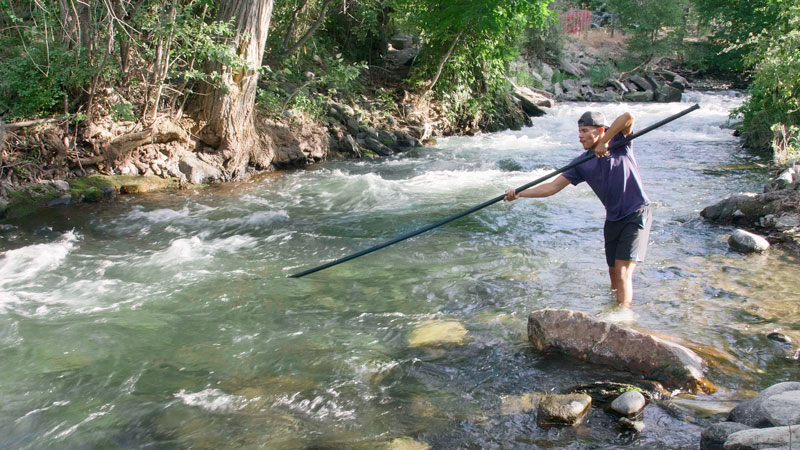
Socially-Conscious Filmmaking
Bend filmmaker Jesse Locke said his new documentary, A Reflection of Life, is the best work he has helped produce. While Oscar recognition would be welcome, he hopes it will help people fully realize just how important our water sources are to life. The full-length documentary is part of a series of social justice films made in partnership with World Muse and will premiere in Central Oregon this spring after being in production since summer of 2022.
“Each year we look around and see what the community conversations are; what keeps coming up over and over?” said World Muse Founder and Director, Amanda Stuermer. “There were so many water issues popping up, from the Warm Springs reservation’s resort development to the boil water notices, and broader conversations about water throughout the Northwest.” A Reflection of Life focuses on water issues, specifically in Oregon, and amplifies Indigenous experiences and stories. Voices in the film are from members of Warm Springs, Umatilla, Nez Perce, Klamath, Yakima, Hopi, Standing Rock and Valdez tribes.
The series came about when World Muse and Unlocked Films partnered for the first time in 2019 to create the short youth documentary, A Reflection of Hope, about the Generation Z population in Central Oregon, which originally demonstrated how impactful films could be for a larger audience.
Making these social justice films is a passion for Unlocked Films founder, Locke, who said each of the Reflection series films have important issues that may make some people uncomfortable, but he says that’s okay because that’s how we start a conversation. “We are all in this together, and the more you know about other cultures and other people, the less frightened you become,” said Locke. “At the end of the day, we are all humans trying to provide for the people we love.”
In 2020, the next film in the series, A Reflection of Change, was produced during the height of the COVID pandemic. “We took a deep look into the BIPOC community and researched their traumas, especially with the pandemic and lockdown,” said Stuermer. Next, they produced A Reflection of Self in 2021 about the LGBTQIA+ community. It was with A Reflection of Self that MUSE fully realized the impact of films going out to a broader global audience, as this film won a best documentary award at an international film festival in Barcelona, Spain.
“Our films live beyond the event; our films can travel to different schools and communities,” said Stuermer, who estimates World Muse has impacted thousands of people since its founding in 2009, and its beginnings as a catalyst for change and empowerment for women and girls.
“With the pandemic we found it was a turning point; people’s attention spans changed, and through film we had more access to provide more information to more people. Films allow us to create empathy as we look at various issues, it’s a different experience, films land in a different way,” Stuermer said.
While Locke said he has loved every film in the Reflection series, he said A Reflection of Life moved him to tears while he edited down about sixty hours of raw footage to an hour and a half. He believes it’s the best work to date. Native elders gave the crew unprecedented access so now through the film, their voices talking about land and water may be shared with a broader audience.
World Premiere
A Reflection of Life debuts April 20 at the Tower Theatre and at the Madras Performing Arts Center. The film will also be available virtually that night. The Conversation Series with various Native American producers will be held the following day on April 21 at The High Desert Music Hall in Redmond.
See theworldmuse.org.



